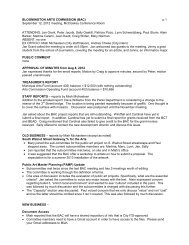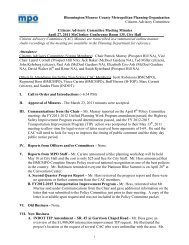Peak Oil Task Force Report - City of Bloomington - State of Indiana
Peak Oil Task Force Report - City of Bloomington - State of Indiana
Peak Oil Task Force Report - City of Bloomington - State of Indiana
Create successful ePaper yourself
Turn your PDF publications into a flip-book with our unique Google optimized e-Paper software.
esidents who work from home, however, this group declined by 6%. Meanwhile, the<br />
portion <strong>of</strong> workers with commutes between 20 to 44 minutes increased by 10%. 113<br />
The <strong>City</strong> should seriously examine a telecommuting policy wherein employees are<br />
encouraged to work from home once a week, if appropriate to their duties. A number <strong>of</strong><br />
municipalities have already implemented such policies. 114 Not only does such a policy<br />
reduce the <strong>City</strong>’s reliance on petroleum to get employees to work, but it also decreases the<br />
<strong>City</strong>’s electricity consumption and reduces greenhouse gas emissions while improving<br />
employee morale and retention. 115<br />
10. The <strong>City</strong> should explore a fourday work week.<br />
Both the <strong>City</strong>’s Sanitation Division and the Monroe County Highway Department have<br />
moved to four‐day work weeks in an effort to save fuel. The <strong>City</strong> should identify positions<br />
for which such a configuration might make sense. If paired with some form <strong>of</strong><br />
telecommuting, this promises to substantially reduce employee drive time.<br />
11. Seek assistance with park maintenance from volunteers, neighborhood<br />
associations, etc.<br />
This would reduce the number <strong>of</strong> vehicles travelling to parks to mow and maintain<br />
facilities. The <strong>City</strong> might begin such an initiative with a few AdoptaPark trial runs to<br />
assess how such volunteer provisioning would best work.<br />
113 2000 US Census.<br />
114 Examples include San Francisco, San Diego, Portland, OR; Atlanta; Virginia Beach, VA; and Denver, CO.<br />
Indeed, US cities have experienced high growth in rates <strong>of</strong> telecommuting to work from 2006 to 2007, most likely a<br />
direct impact from rising fuel prices. Oakland had the highest telecommuting rate, at 7.6% in 2007, while six US<br />
cities—San Francisco, San Diego, Portland, OR; Atlanta; Virginia Beach and Denver‐‐had more than 5% <strong>of</strong> their total<br />
workforce being primarily home based. Karlenzig, Major US <strong>City</strong> Post<strong>Oil</strong> Preparedness Ranking Which Cities and<br />
Metro Areas are Best or Least Prepared for Price Volatility, Supply Shocks and Climate Change Regulations?<br />
http://www.commoncurrent.com/pubs/MajorUS<strong>City</strong>Post‐<strong>Oil</strong>PreparednessRanking.pdf<br />
115 Ravi S. Gajendran and Harrison, David A, “The Good, the Bad, and the Unknown about Telecommuting:<br />
Meta‐analysis <strong>of</strong> Psychological Mediators and Individual Consequences,” Journal <strong>of</strong> Applied Psychology, 92(6)<br />
(November 2007): 1524‐1541.<br />
<strong>Report</strong> <strong>of</strong> the <strong>Bloomington</strong> <strong>Peak</strong> <strong>Oil</strong> <strong>Task</strong> <strong>Force</strong><br />
78









